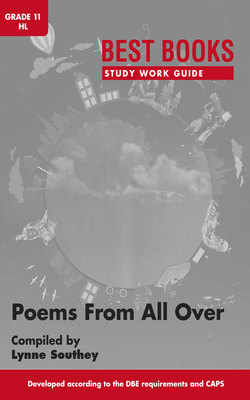Читать книгу Best Books Study Work Guide: Poems From All Over Gr 11 HL - Lynne Southey - Страница 12
На сайте Литреса книга снята с продажи.
London, 1802 by William Wordsworth
Оглавление(See p. 16 in Poems From All Over)
| Title: | The poem is about London, as the speaker/poet sees it in 1802. |
| Theme: | The need for renewal of moral values in London (England). |
| Mood: | Pleading, urgent, unhappy. |
Discussion
According to the speaker, London and its people have lost their way and the city is no longer what it used to be. People are not happy and have become selfish, have lost “manners, virtue, freedom, power”. The speaker calls on John Milton (1608–1674), who was an influential statesman and poet of the previous century, to come back and restore the England he had helped create. Milton was a unique human being (“dwelt apart”), unselfish and committed, and without him and his values England has become a “fen of stagnant waters”.
The poem is a sonnet: the octet calls on Milton and explains what has become of London and why Milton is needed; the sestet praises Milton for the kind of person
he was.
Analysis
| Lines | Comment | |
| 1–8 | The speaker wishes that Milton were still alive as the country needs him because she has become stagnant.The church (“altar”), the army (“sword”) and literature (“pen”); the people (“fireside”), the wealthy people (“heroic wealth of hall”) and even the countryside (“bower”) have given up or lost their ability to be happy with themselves (“inward happiness”). Men, and he includes himself, have become selfish. He calls for Milton to come back and raise them all to their former and better state in which they behaved well (“manners” and “virtue”) and England was a free a powerful country. | In these eight lines the poet has condensed a great deal: he is addressing the late John Milton, whom he says the country needs; he explains why by describing what has become of people and the country; he pleads for Milton to return and lists the four main things that England needs and that they had when Milton was still alive. This is a remarkable feat, and it is done within the constraints of the sonnet form.Notice the use of metonymy (through which a part is used to refer to the whole).Notice the language (“thou”, “shouldst”, “hath”), which is the language of the time. |
| 9–14 | Milton’s “soul” or character was like a “Star”, elevated and above that of the common man. He stood out (“dwelt apart”) because of the qualities he had. His voice (or what he said) was loud enough to be heard, and powerful (people listened to him), “pure …, majestic, free”, conveying virtues that were admirable. And that is how he lived his life, cheerfully and piously (“in [g]odliness”) and yet he was the kind of man for whom no task was too humble. | The sestet praises Milton and gives his qualities. No reference is made to London or England in this section, but the reader understands that a man with Milton’s strength of character and integrity is needed to uplift the people and the city again.Notice the comparisons with star and sea, eternal entities that are larger than human life, and to which he compares Milton. |
Contextual questions
1.Write out the rhyme scheme of the poem. (2)
2.The above comment on the sestet mentions “the constraints of the sonnet form”. What are these in the context of the notes? (3)
3.Identify the two similes in the sestet and explain how using them adds to the description of Milton’s qualities. (6)
4.Read line 6 again. What effect does the caesura (pause, break) in the line have on the meaning? (6)
5.In your opinion is this sonnet more in praise of Milton, or a lament about the state of England? Give reasons for your answer with reference to the poem. (3)
(20)
| Enrichment activityRead up on what London was like at the beginning of the eighteenth century. |
(John Rennie’s 19th century London Bridge)
